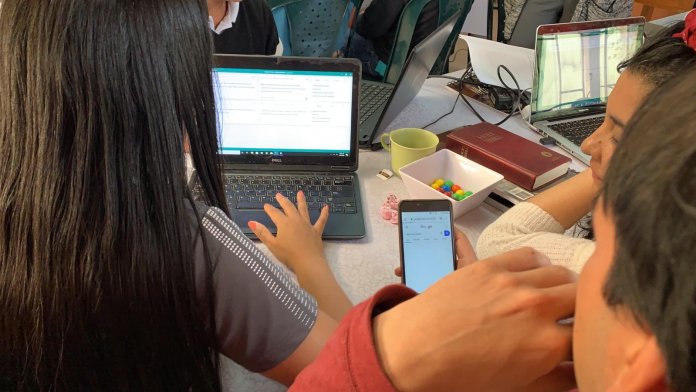Pastor Basil* and his team who help to lead one of unfoldingWord’s partner organizations in Latin America are translating bible stories for the Zamora* people, living deep in the jungles of South America.
875,000 people in the region currently have no scripture in their language but in this closed country, the numerous risks involved with conducting a Church-Centric Bible Translation project didn’t stop Pastor Basil* and his team. Their compassion for friends and family who want to know more about Jesus motivates them.
A normal day for the translation team begins with worship, a devotional and team building. These are essential components of the church-centric approach to ensure the discipleship of the translator and the building of the team.
Rather than merely working to produce a product, they are cultivating Christian maturity as they build bible translation capacity for their local churches.
Arranging the translation workshop for the Zamora people is no small feat, but that was the easy part. The team faced much adversity to simply arrive at a safe location to begin this work. The challenge was to get everyone to the centralized training location, along with food and supplies to last a week.
In the jungle, rivers are the highways. Few roads penetrate the forest, and drug cartels and anti-government guerrillas endanger travellers.
The team took 13 copies of Open Bible Stories to 13 villages in the Zamora* region. Provisions for a trip like this would last many days.
The entire translation team, no matter what direction they were coming from, put their lives at risk as they passed through guerrilla-controlled areas.
Everyone travels by river and everyone has to negotiate with a middle man for a boat and a pilot.
One of the translators spent three days travelling downriver by canoe. Another found a boat with a motor and travelled five days upriver, avoiding an otherwise seven-day paddle. Both journeys required significant expense to even find the boats and pay to use them.
Meanwhile, blockades sealed off the city where Pastor Basil* lives.
Departure day for Pastor Basil* to get to the safe location was the very day his city was sealed off by workers on strike. They blocked all the exits with buses, trucks, and other barriers, angrily demanding more pay.
Describing the situation, he said: “The government would not allow anyone in or out. We did not know how we were going to get out of the city to get to this place.”
So, he prayed:
“God, this is your trip, this is your journey. Please help us know how to get out of here.”
With strong resistance to any bible translation work from the government, negotiating their way out wasn’t an option.
As he drove around looking for answers, Pastor Basil* received a text from a friend which read “Take the dirt road through District B. No blockade there.” District B was known as a high-crime area but with determination, he kept driving eventually out of the city and without being seen by any guards.
After such a commute, more challenge followed. Wrestling with the concepts and practice of translation ispar for the course but the end outcome will have a lasting impact on the growth and discipleship of their communities.
Sometimes, individuals are so deeply invested in the work and deeply committed to a particular interpretation that conflict happens.
In their tenacity about the ministry, it becomes easy to forget the Lord is in the process.
Like any other human endeavour, disagreements can be intense. That’s why every session ends with prayer and the sharing of testimonies of how God has worked in their lives.
Every time this translation team arrange a workshop to continue their work, they become more at risk of attracting unwanted attention from both the government and guerrilla groups.
Yet they keep going.
Due to their determination, they now have six Open Bible Stories translated into the heart language of the Zamora* people.
Kelly Cox Vivanco, Marketing Project Manager for unfoldingWord said, “Growing up in Latin America, I’ve seen the lack of access to some resources that are available only in the English language, and as a Spanish speaker, I would feel frustrated not to have access to that knowledge. After having the blessing to work in this training with the Spanish team, I met indigenous brothers and sisters who have no scripture in their heart language, and I could understand their deep desire to bring it to their families and community.
I understood the frustration but more over their determination. No physical obstacle is big enough when you finally have access to the knowledge, in this case, of how to translate the Bible into your heart language. Something unimaginable for so many years. Now through Church-Centric Bible Translation, the church is being strengthened in hard-to-reach areas.”
This team of translators are part of the Latin American Spanish Whole Bible Whole Nation Project using the emerging model, Church-Centric Bible Translation, to translate Bible resources and fifty Bible stories spanning Genesis to Revelation. This emerging model emphasizes autonomy, training translators from other people groups to use tools to translate the Bible for themselves.



